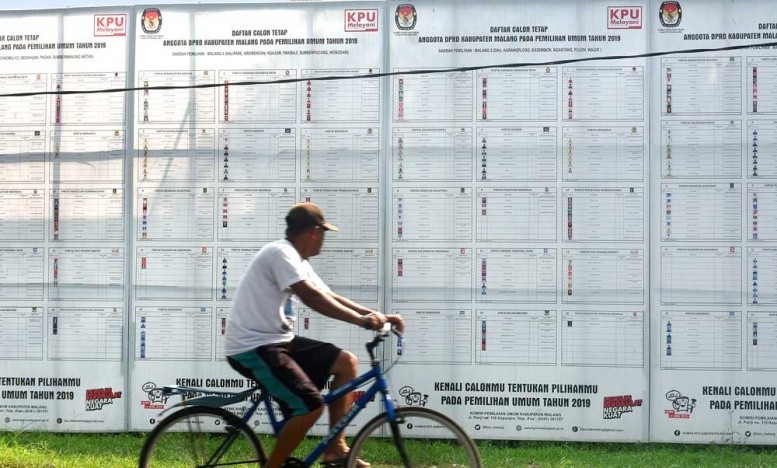Popular Reads
Top Results
Can't find what you're looking for?
View all search resultsPopular Reads
Top Results
Can't find what you're looking for?
View all search resultsCourt ruling may sway 2024 election results
Court currently weighing constitutionality of open-list system.
Change text size
Gift Premium Articles
to Anyone
A
n upcoming Constitutional Court ruling on the legislative election system could be a game changer for 2024, with the country’s biggest party the Indonesian Democratic Party of Struggle (PDI-P) poised to gain the most should the court rule in its favor.
The court is reviewing a petition filed by a PDI-P member and several other plaintiffs that seeks to restore a closed-list system for the legislative elections, in which voters solely vote for parties that in turn exclusively decide the winning candidates proportionate to the number of votes won.
If granted, this would be a departure from the prevailing system, which allows voters to choose among legislative candidates on open-list ballots.
Bawono Kumoro of pollster Indikator Politik Indonesia told The Jakarta Post that a return to the closed-list system could give the PDI-P, of which President Joko "Jokowi" Widodo is a member, an edge over its rivals in the upcoming legislative race.
A December public opinion poll by Indikator Politik showed that the PDI-P cemented its lead with 25.7 percent of the vote, with the Golkar Party and Gerindra Party trailing behind with 10.5 percent and 9.5 percent, respectively. The PDI-P has remained at the top of the polls since the 2019 election, standing at between 23 and 29 percent, higher than the 19 percent of the vote the party gained in the last election.
"The PDI-P has the most loyal voter base compared with others and has consistently gained a comfortable lead over its rivals," Bawono said.
"With other parties mostly relying on popular or public figures to attract more votes, they will find it difficult to beat the PDI-P in a closed-list system with less than one year left to the elections."
A closed-list system would undermine smaller or even medium-sized parties, Bawono added, as an open-list system helped these parties to boost their electability by putting up legislative candidates with strong appeal to their respective constituencies.
“If we are looking at other parties, such as medium-sized parties like the NasDem Party and even smaller parties like PAN [National Mandate Party], they have mostly relied on popular or public figures to attract more votes. In a closed-list system, the public may have less interest in voting for such parties,” Bawono said.
The December poll showed that NasDem, PAN and the United Development Party (PPP) got 5.1 percent, 2.3 percent and 2.1 percent of the vote, respectively, lower than the percentages of the vote they gained in the 2019 legislative election, with around 10.2 percent, 7.6 percent and 3.3 percent, respectively.
PBB supports petition
The petition recently gained backing from the Star and Crescent Party (PBB), which participated in the 2019 legislative election but did not get enough votes to send representatives to the House of Representatives.
Its chairman Yusril Ihza Mahendra, a legal expert and former advisor to the Jokowi-Ma’ruf Amin ticket in the 2019 presidential election and who recently received Jokowi's support to run in the 2024 presidential race, filed on Friday a third-party intervention in the case so he can present arguments supporting the petitioners.
The PBB, which has been exploring the possibility of aligning with the PDI-P in the upcoming general election, is seeking to patch loopholes in the petition, saying that it has stronger legal standing than the petitioners who did not represent political parties.
The court is set on Tuesday to hear arguments from the House and the government as the two entities that devised the provisions on the open-list format in the 2017 General Elections Law, as well as from the General Elections Commission (KPU). The court has no deadline for deciding a judicial review case but it is expected that the court will decide the petition on the electoral system this year, as the average time it takes to handle a case is almost three months.
Cracks in coalition?
The court is set on Tuesday to hear arguments from the House and the government as the two entities that devised the provisions on the open-list format in the 2017 General Elections Law, as well as from the General Elections Commission (KPU).
The court has no deadline for deciding a judicial review case but it is expected that the court will decide the petition on the electoral system this year, as the average time it takes to handle a case is almost three months.
The push for a closed-list system, Bawono said, would also put the loyalty of pro-government coalition members to Jokowi and their partnership with the PDI-P to test. If the court ruled in favor of the closed-list format, this would hurt their prospects in the upcoming elections.
“This may also spark a disintegration of the ruling coalition as parties may easily turn their back on both the PDI-P and Jokowi if the court rules to ditch the prevailing [open-list] system,” Bawono said.
“A year ahead of the election, each party will start to think seriously about its interests."
Eight of nine parties at the House, both pro-government and opposition, have put up a united front against the closed-list system and are planning to file third-party interventions with the court. The NasDem Party, Prosperous Justice Party (PKS) and some politicians from Golkar have filed two separate requests to intervene in the case.
Hadar Nafis Gumay, Network for Democracy and Electoral Integrity (Netgrit) cofounder and former KPU commissioner, said that changing the electoral format through the court when the election preparation stages were already under way could complicate the already complex elections.
“More importantly, the authority to determine which system to be used does not rest with the court, but with a lawmaking process that includes a meaningful participation,” he told the Post.










